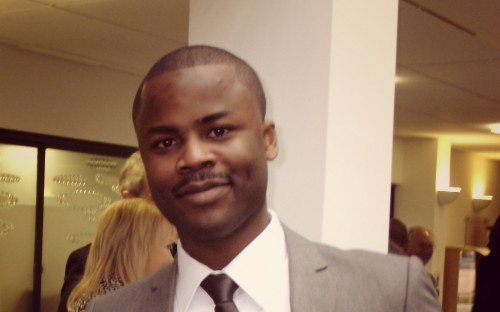But he realized he needed a job to make ends meet – and eventually fund an MBA degree – and quickly landed a job at Barclays.
He entered the leading financial services bank in an advisory role, but within four months moved through the ranks to financial crimes investigator. Part of his role was to prevent money laundering, taking action against corporate and personal accounts with haste. I imagine his role is something like an episode of Homeland, but he assures me it was much more low-key.
“It was mainly investigative work. We looked at a lot of scam cases and identified trends. We were trying to prevent scams,” says Olabode.
“It takes different dimensions; sometimes we looked at individuals trying to defraud people, sometimes into people trying to scam large corporations.”
Before working at Barclays, he was absolutely set on a career in biotech after completing his Cranfield MBA - an industry that uses living systems and organisms to develop or make useful products. But since working for the bank he is less sure and is keeping an open mind about where his career may take him.
On the face of it, you might argue he’d be mad to leave an industry renowned for lucrative pay packets and, more recently, bonuses that are creeping their way back into European banks. But the biotech industry is creating a reputation of its own.
Eight biotech companies raised a combined $502 million in US listings last month, which set a weekly record for the sector that has seen the Nasdaq biotech index rise more than two-thirds in the past year.
Companies focused on pharmaceuticals are arguably the most successful of the biotech surge, and investors seem to be attracted to high-risk ventures in the sector that carry a wave of fresh innovation – even if fears of a bubble are stoked by some commentators.
But for Olabode, it’s what biotech can do for the energy industry that he finds most appealing. “Biotech has always been about solving world problems and energy needs, particularly in developing countries where there’s not a lot of access to oil and gas,” he says.
“It’s applicable to countries that have less resources. In Nigeria, we actually rely mostly on fossil fuels and it will be a big challenge switching to bio energy – but it will also be competitive.”
Before beginning an MBA at Cranfield University School of Management, Olabode studied an MSc in Biotechnology at the University of Warwick. When he left Nigeria, it was to build a skill-set to take on the biotech industry in a country that is one of the most advanced in the sector.
He chose to begin an MBA to gain all-encompassing business knowledge to back-up his education in biotech.
“It’s one of the best decisions I’ve ever made,” he explains. “With an MBA you get to understand all aspects of business. It gives you that sense of security.”
Yet the lure of working in biotech, and perhaps even entrepreneurship, remains strong. According to EY, the leading auditor, public companies in the four established biotech centers (US, Europe, Canada and Australia) achieved revenues of $89.8 billion in 2012, an 8 per cent increase from 2011.
And it is not just the industry leaders that stirring interest in the business community. Bio Blast and Galmed, two biotech start-ups, are set to raise $70 million on Wall Street this year. Renewable Energy Group, America’s largest biodiesel producer, last month acquired chemical technology developer LS9 for $61.5 million, a move said to take them into the industrial biotech sector.
Investors are keen to back fledgling biotech start-ups because of the industry’s potential, says Olabode. “The interest is because of the potential this brings for the future and also energy solutions,” he says.
“A lot of countries are investing in fracking right now and other forms of alternative energy. Oil companies are investing in biotech and other companies are looking at solar power.
“We know that we will need more of these solutions in the future as energy consumption increases. There will always be demand for it. But how will we solve it? If we can solve it [with biotech], then people will invest.”
He also sees entrepreneurship as a way to enter the industry. It’s part of the reason why he chose Cranfield’s MBA program. It depends on which option is more feasible at the time, but “the ultimate goal is starting my own company”.
Start-ups, of course, come with a huge degree of risk. It certainly won’t be a comfortable ride but money is not Olabode’s main priority. “It’s the last thing to be concerned about,” he says, surprisingly.
“Money is significant but with an MBA, you will have a significant boost in income anyway.” The figures speak for themselves: according to the Financial Times, Cranfield alumni see a salary increase of 75 per cent.
He admits most start-ups make a loss, but he is undeterred. “Profits come after some time. But income isn’t important to me. What is important is making a change and doing something the world is in need of,” he adds.
And does it worry him that he’ll make less than when at Barclays? Not really, he replies. “What gives me satisfaction is creating something that people will benefit from. That will be the MBA tuition actually paying for itself, over and over again.”
RECAPTHA :
ae
c1
84
27







